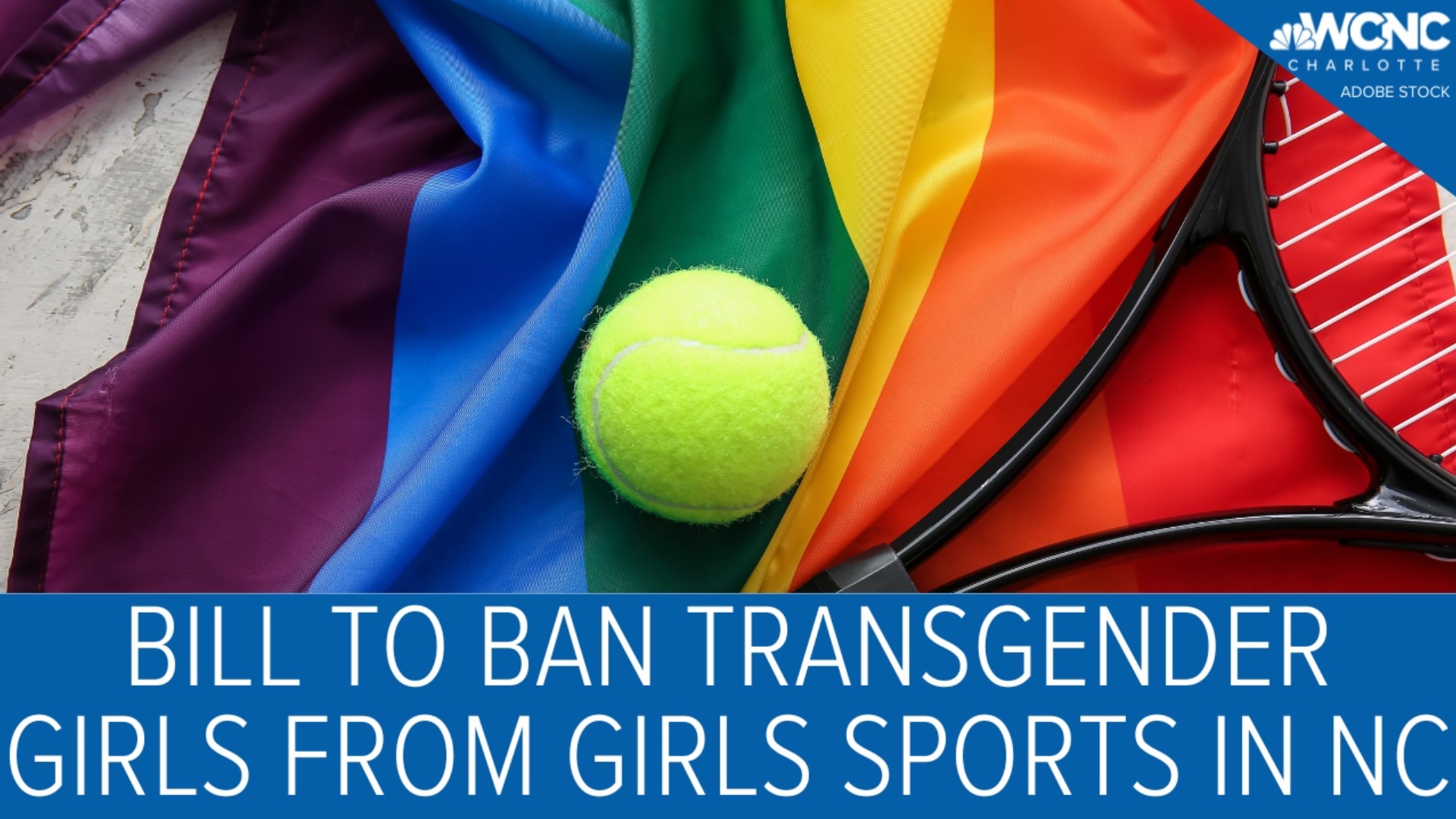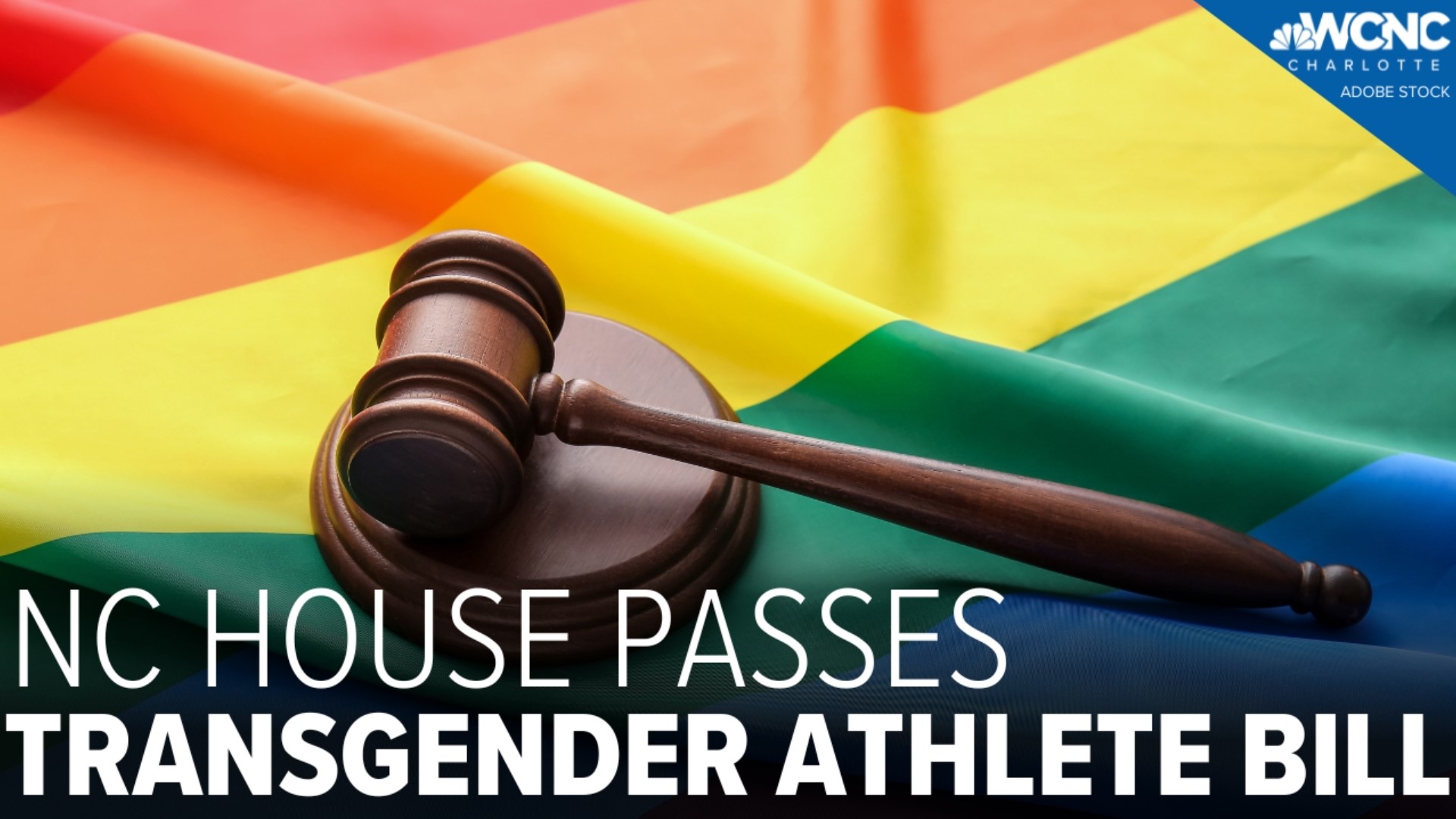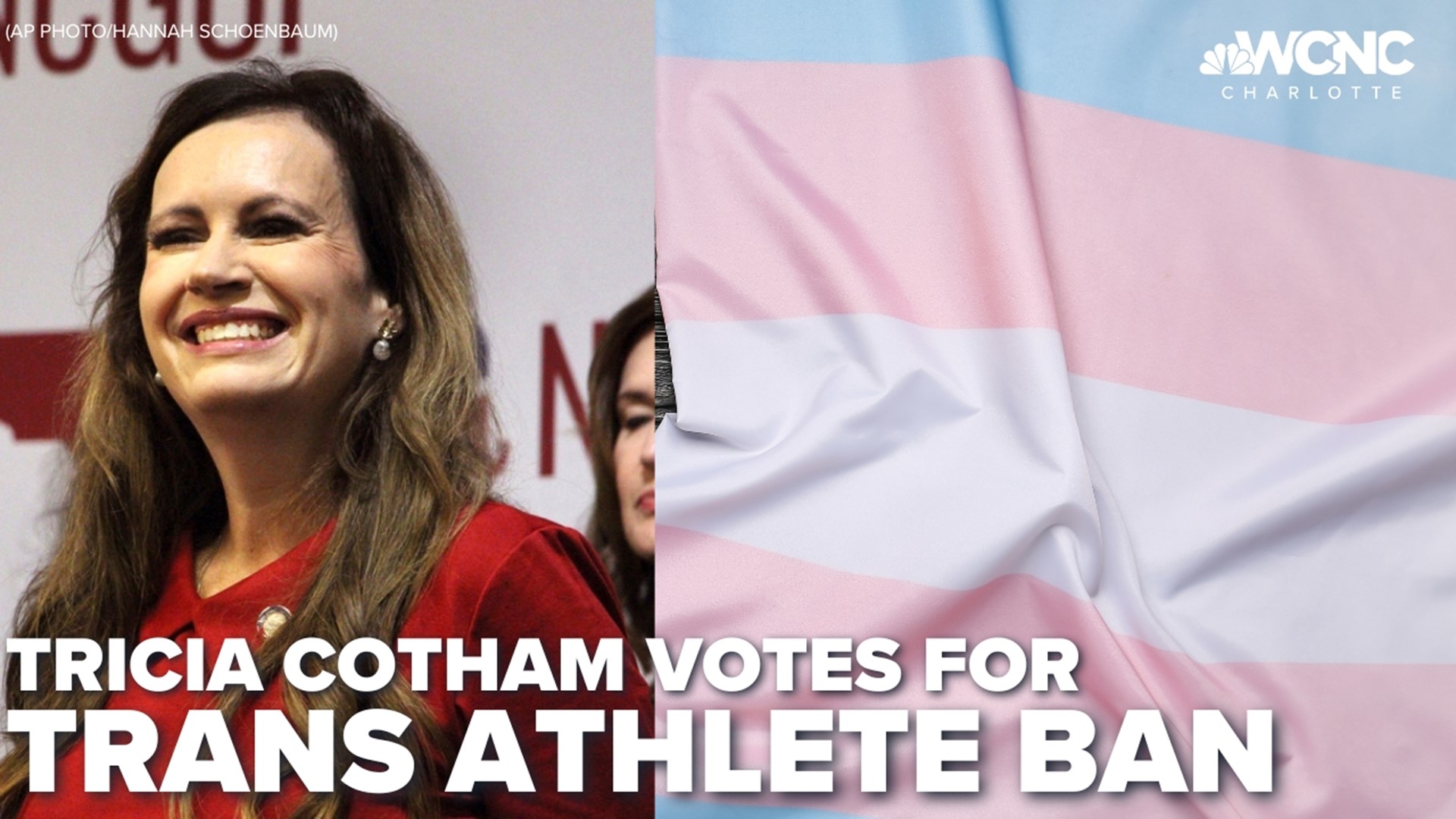RALEIGH, N.C. — The North Carolina House passed the "Fairness in Women's Sports Act" on Wednesday. House Bill 574 states transgender girls are prohibited from participating in sports that correspond with their gender identity.
Wednesday, lawmakers were joined by NCAA Champion Riley Gaines, a D1 swimmer from the University of Kentucky. She spoke out against the idea of transgender women competing in sports. She called the bill common sense and said for her, it hit close to home.
“What I’ve been doing is this,” Gaines said. “I’m testifying. That’s why I’m grateful to be in North Carolina -- I’m hopeful they will do the right thing.”
Gaines competed against transgender athlete Lia Thomas in the 2022 NCAA Division 1 women's swimming and diving championships. Gaines said Thomas had an unfair advantage.
“This was a biological male that went from ranking 462 at best among men the year prior, to now dominating among the women,” Gaines said.
But others said these claims couldn’t be farther from the truth. Liz Schob with Charlotte Pride said these bills are harmful to the LGBTQ+ community and called this bill transphobic.
“This is 2023, sexism is so tired, and the idea that someone’s performance is boiled down to their sex or their gender identity is a very tired narrative,” Schob said.
North Carolina took its first steps to join more than 20 other states in banning transgender girls from playing on girls' sports teams in middle school and high school Tuesday morning.
If enacted into law, transgender girls would be prohibited from participating in sports that correspond with their gender identity under a bill that advanced Tuesday in the North Carolina Senate.
The Senate education committee advanced the "Fairness in Women's Sports Act" on a voice vote with Republicans on the panel saying such a blanket ban is necessary to protect biological girls and saying that the small number of transgender girls, estimated at 15, currently participating in North Carolina is too many.
MORE NEWS: Lawmakers concerned with social media platforms, as criminals are stealing sensitive information
"I say 15, that's too high," said Rep. Vickie Sawyer, an Iredell County Republican and one of the bill's primary sponsors, according to WRAL.com. When asked why the law is needed if the state's high school association already has procedures in place, she said: "The number is 15. We made 15 wrong decisions."
North Carolina Republicans held a news conference earlier this month defending SB 631, which is among the first to advance through committee after Republicans returned from spring recess this week with newly veto-proof margins — made possible by Mecklenburg County Rep. Tricia Cotham’s recent switch from Democrat to Republican. At that news conference earlier this month, republicans invited two North Carolina coaches to speak on behalf of the proposal.
"I support transgender athletes," Sylvia Hatchell, the former head basketball coach for UNC at Chapel Hill, said. "OK, the right to gender identity as see[n] fit. However, competitive sport is one of the few places in our society where sex differences matter."
Hatchell resigned from UNC at Chapel Hill after a program review found concerns over "racially insensitive" comments and pressuring players to compete through medical issues.
Republicans' recent gains in Raleigh essentially eliminate the need for Republicans to pull in a Democrat to override any veto from Gov. Roy Cooper, giving them a clear path to further similar LGBTQ+ restrictions passed by other states that hadn't previously gained traction in North Carolina.
That became more evident Wednesday morning. Rep. Cotham voted in favor of House Bill 574 in the education committee she chairs and later voted for it on the House floor. WCNC Charlotte reached out to Cotham around 2 p.m. Wednesday for comment but did not hear back before the close of business. We will update this article if she chooses to do an interview or provide answers to questions given to her.
During Cotham's campaign as a Democrat, she ran on a platform championing LGBTQ rights.
Reaction to the passage of House Bill 574 was swift on both sides of the aisle. LGBTQ advocacy group Equality NC slammed it as another move by legislators targeting transgender youth. Kendra R. Johnson, the group's director, harkened back to the beleaguered House Bill 2 in 2016. That bill, signed into law by then-governor Pat McCrory (R), sought to place restrictions on trans citizens' access to bathrooms matching their gender identity.
"We are once again enraged by the actions of our legislators, who continue to make bullying trans kids the centerpiece of their political agenda. Ignoring the many voices who spoke out against HB 574, our lawmakers have moved forward with a bill that does not represent us or our communities. Alongside a slew of other harmful legislation, this bill is a step backwards," said Johnson. "And it is a step back down the route of HB 2, which we already saw devastate our state’s economy in 2016. Our legislators need to let queer and trans kids be kids, in sports, at school, and in every other facet of their lives."
The NC Values Coalition, in contrast, praised the passage of HB 572, saying it would create a "level playing field" for female athletes. The group, which traditionally engages public policy from a religiously conservative standpoint, also lauded testimony earlier in the day from former University of Kentucky swimmer Riley Gaines and former North Carolina high school volleyball player Payton McNabb.
Gaines notably tied for fifth place with transgender swimmer Lia Thomas in the 2022 NCAA Division 1 women's swimming and diving championships. McNabb, a high school senior who used to play volleyball in western North Carolina, claims she was severely injured after a transgender competitor on an opposing team spiked the pall in her face. She said that has led to longstanding health issues, such as memory problems, vision issues, partial hand paralysis, and more.
The American Medical Association said in a report in 2022 it, "opposes athletic eligibility regulations that contribute to discrimination and stigma attached to naturally occurring differences in gender and sexual identity, sexual development and orientation."
The North Carolina High School Athletic Association allows transgender student-athletes to play sports based on their gender identification upon request.
A blanket ban on transgender students could face future scrutiny from the U.S. Department of Education.
Earlier this month the Biden administration reversed a Trump-era interpretation of Title IX law as it relates to the gender identity of students and their protections under the law. It contended that blanket bans on transgender athletes participating on school sports teams consistent with their gender identity would be a violation of the law.
Instead, schools need to have an analysis done that would support any restrictions.
This legal argument is one that courts, state legislatures, and the Department of Education all have varying opinions on.
"The law, the statute says absolutely nothing about transgender students," Jonathan Vogel, an expert in education law said. "The law prohibits discrimination on the basis of sex."
Vogel has served at the U.S. Department of Education as the Deputy General Counsel for Higher Education and Regulatory Services.
He said the interpretation of Title IX protections, not explicitly listed in the statute, can change from administration to administration.
The big question right now: Does Title IX include gender identity under its sex discrimination protections?
"Title IX is an evolving area of the law when it comes to gender identity," Vogel said. "You've seen the current administration has reversed the prior administration, you see two circuit courts of appeals having diametrically opposed decisions."
In 2020, the U.S. Fourth Circuit Court of Appeals ruled in favor of a transgender student who sued his Virginia high school for barring him from using the boy's restroom.
The ruling decided that restroom policies segregating transgender students from their peers violated Title IX on the basis of sex discrimination.
A more recent case in the U.S. Eleventh U.S. Circuit Court of Appeals ruled in an opposing manner to a similar case involving a transgender student's rights to use the bathroom of their gender identity.
"It decided the Title IX does not include discrimination on the basis of gender identity," Vogel said. "So what you have is what we call a circuit split."
This could lead to the U.S. Supreme Court taking up the issue, although it has yet to do so.
Another avenue for clarity on this issue is Congress.
"Congress can amend the statute, or Congress can debate and choose not to amend the statute," Vogel said.
The different interpretations of Title IX are putting school districts in legal jeopardy.
"A school district could find itself in a position where it is complying with Title IX in so far as how the U.S. Department of Education interprets it, but perhaps not complying with Title IX so far as how the court system interprets it," Vogel said.
Depending on whose guidance it takes school districts could face lawsuits from private citizens, penalties from state governments, and a possible loss of federal funds.
North Carolina Republican lawmakers Tuesday also proposed a bill that would make it illegal to host drag shows in public places. House Bill 673 would lump at least some drag performances — what the bill calls "male or female impersonators who provide entertainment that appeals to a prurient interest" — in with strippers and other adult entertainers in state law.
The Associated Press and WRAL contributed to this report
Contact Shamarria Morrison at smorrison@wcnc.com and follow her on Facebook, Twitter and Instagram.
Contact Austin Walker at awalker@wcnc.com and follow him on Facebook, Twitter, and Instagram.
Flashpoint is a weekly in-depth look at politics in Charlotte, North Carolina, South Carolina, and beyond with host Ben Thompson. Listen to the podcast weekly.
SUBSCRIBE: Apple Podcasts || Spotify || Stitcher || Google Podcasts
All of WCNC Charlotte's podcasts are free and available for both streaming and download. You can listen now on Android, iPhone, Amazon, and other internet-connected devices. Join us from North Carolina, South Carolina, or on the go anywhere.



